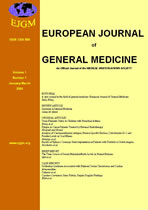
|
European Journal of General Medicine
Medical Investigations Society
ISSN: 1304-3897
Vol. 7, No. 2, 2010, pp. 130-135
|
 Bioline Code: gm10025
Bioline Code: gm10025
Full paper language: English
Document type: Research Article
Document available free of charge
|
|
|
European Journal of General Medicine, Vol. 7, No. 2, 2010, pp. 130-135
| tr |
Lomber Disk Herniasyonunda Başarısız Bel Cerrahisi; Epidural Fibrozis ve Nüks Olgularının Reoperasyondaki Başarı Skorlamasının Retrospektif İncelenmesi
Metehan Eseoğlu & Hidayet Akdemir
Amaç: Bu çalışmada Lomber DH cerrahisi sonrası görülen BBC, özellikle epidural fibrozis ve nüks olgularının reoperasyondaki başarı skorlamaları yapılarak retrospektif olarak incelenmiştir.
Metod: Çalışmamız Ocak 2000- Aralık 2006 tarihleri arasında kliniğimizde lomber disk hernisi nedeniyle opere edilen toplam 1268 olguda yapıldı. Çalışmaya dahil edilen olgular arasında 70 olgu BBC olarak değerlendirilip radyolojik bulguları, ameliyat bulgularıve klinik bulguları retrospektif olarak analiz edildi.
Bulgular: Olguların 36’sı kadın (%51.4), 34’ü erkek (%48.6), yaş sınırı 22-74 arasında olup, yaş ortalaması 49.9 bulundu. 45’i (%64) nüks DH, 9’u (%12.8) epidural fibrozis ve nüks DH, 8’i (%11.4) paraspinal abse, 1’i (%1.4) postoperatif diskitis, 3’ü (%4.2) darkanal, 3’ü (%4.2) foraminal stenoz, 1’i (%1.4) de BOS fistülü nedeni ile reopere edildi. Reopere edilen epidural fibrozisli vakalarda başarı oranı % 37.3 bulunurken, nüks DH lerde ise %75.9 olarak bulundu. İstatistiksel karşılaştırılması anlamlı bulundu (p<0.05).
Sonuç: Lomber DH operasyonu geçiren hastalarda en sık (%64) reoperasyon sebebi aynı seviyede, aynı taraf veya karşı tarafta oluşan nüks disk hernileridir epidural fibrozis bulunan olgular radyolojik ve klinik olarak çok iyi değerlendirmeli en uygun tedavi planı amaçlanmalıdır.
Başarısız bel cerrahisi, nüks disk hernisi, epidural firozis
|
| |
| en |
Failed Back Surgery Syndrome in Lomber Disc Herniation: The Retrospectıve Analysis of Success Scorings of Epidural Fibrosis and Recurrent Cases in Reoperations
Metehan Eseoğlu & Hidayet Akdemir
Abstract
Aim: In this work, failed back surgery syndrome(FBSS) which observed in Lomber disc herniation(DH) postoperatively is analysed; and especially epidural fibrosis and recurrent cases are retrospectively analysed through calculating the success scores.
Method: Our work had been carried out between January/2000 – December/2006. In our clinic, 1268 cases in total were examined that were operated by reason of lomber disc herniation in our clinic. Among the cases that were included to the study, the 70 were evaluated as FBSS and the radiological evidences, surgical and clinical findings were analysed retrospectively.
Result: Of all the patients 36 were women (51%), the 34 were male (48.6 %). Their ages changed between 22-74 and the age average was found as 49.9. Of all the reoperated cases; the 45 (64%) were reoperated by reason of recurrent DH, 9 (12.8%) epidural fibrosis and recurrent DH, 8 (11.4% ) paraspinal abse, 3 (4.2%) lomber stenosis, 3 (4.2%) foraminal stenosis, 1 (1.4%) postoperative discitis, 1(1.4%) Cerebro spinal fluid (CSF) fistule. While the success rate of the cases with epidural fibriosis was found as 37.2 % ; 75.9% success rate was recorded for the patients with recurrent DH. Statistical comparison was found as meaningful. (p< 0.05)
Conclusion: The most frequent reoperation cause for the patients who were operated by reason of lomber DH is the recurrent herniations which occur at the same level; the same side or the opposite side. The cases with epidural fibriosis must be well-assessed radiologically and clinically and the most effective treatment plan should be aimed and formed.
Keywords
Failed back surgery, recurrent disc herniation, epidural fibrosis
|
| |
© Copyright 2010 European Journal of General Medicine.
Alternative site location: http://www.ejgm.org
|
|
